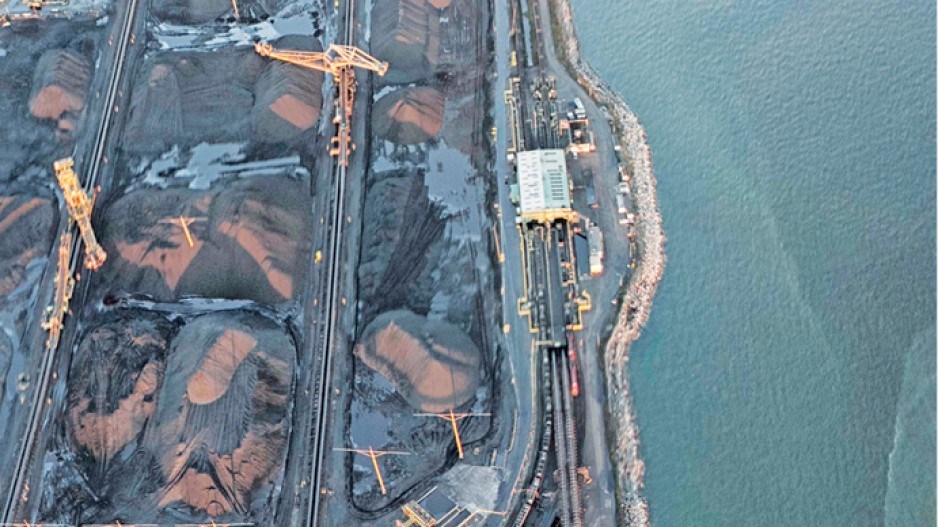Anti-coal activists hoping a glut of steelmaking coal will kill a controversial proposal to build a new coal-handling terminal in Surrey may be disappointed.
Fraser Surrey Docks plans to build a new coal-handling facility that would be used to transfer four million tonnes of thermal coal annually from the U.S. onto barges, which would take it to Texada Island for loading onto bulk carriers destined for Asia.
But a sudden surplus of metallurgical or "met" coal has resulted in B.C. coal mines being either idled or prevented from restarting, which begs the question: does B.C. need another coal terminal if exports of coal from the province start going down?
B.C. has three other major coal terminals, one of which – Ridley Terminals in Prince Rupert – experienced a dramatic drop in met coal shipments in the first quarter, according to Prince Rupert Port Authority statistics.
"Are we going to be left with a lot of stranded, idled infrastructure because coal fundamentals have shifted?" asked Kevin Washbrook, a director for Voters Taking Action on Climate Change.
Metallurgical or coking coal, used in making steel, is B.C.'s single largest bulk export, according to the provincial government, and accounts for 27,000 jobs, so a prolonged downturn in met coal demand would have a serious impact on B.C.'s economy.
"It is a significant export. It's probably the second-biggest employer in my union," said Mark Gordienko, president of the International Longshore and Warehouse Union Canada.
But economists and industry insiders agree that the global market for coal, especially the steelmaking coal produced in B.C., is expected to remain strong, and that curtailments in production will eventually reduce a surplus of cheap coal and move prices back up.
"It will take probably 18 months, 24 months for the market to pick up," said Scotiabank commodity market specialist Patricia Mohr.
"The long-term projections for coal – both steelmaking and thermal coal – globally are very, very strong in the mid-to-long term," said Ann Marie Hann, president of the Coal Association of Canada.
Met coal prices have dropped from US$300 per tonne in 2011 to about US$100 per tonne today. Weather-related downturns in production in Australia caused met coal prices to soar.
But Australia has been ramping up its met coal output, so some of the less efficient mines elsewhere are now being idled, including three in B.C.
Walter Energy Inc. (TSX:WLT) recently shut down its mine in Tumbler Ridge, resulting in 415 layoffs, and plans to idle its mine in Chetwynd in July, causing the loss of another 280 jobs. That's on top of last year's idling of Walter Energy's Willow Creek mine near Chetwynd.
Teck Resources Ltd. (TSX:TCK.B) has also been hurt by the glut of met coal but has managed to keep its five B.C. coal mines and one Alberta mine operating.
Teck is in a stronger financial position than many of its competitors, analysts say, so it can continue to operate even when the prices are low.
"Teck is at the lower end of the cost curve, so they should be among the last to be affected," said Denis Horgan, vice-president of Westshore Terminals Investment Corp. (TSX:WTE) in Delta.
Teck is the second-largest seaborne coking coal supplier in the world and Westshore's biggest customer, accounting for 56% of its business in 2013.
Westshore has invested hundreds of millions in upgrading its facilities to increase its handling capacity from 24 million tonnes annually in 2007 to the current 33 million tonnes – about eight times the capacity of the proposed Fraser Surrey Docks proposal.
About 60% of Westshore's business is metallurgical coal and 40% is thermal coal.
Despite a global glut of met coal, Horgan doesn't expect B.C. terminals to experience any major slack when it comes to shipping either thermal or steelmaking coal.
"We have been running at capacity, turning away business now for three or four years," he said. "Even though the market seems soft right now, there's still, in my opinion, quite a shortage of port capacity on the northwest [coast]."
Whereas Teck ships its coal through Westshore Terminals and Neptune Terminals in Vancouver, Walter Energy ships its coal through Ridley Terminals in Prince Rupert.
Shipments of met coal through Ridley Terminals were down 60% in February and 35% in March, according to Prince Rupert Port Authority statistics. Ridley Terminals refused to comment on the dramatic decline.
Port Metro Vancouver also would not comment on potential impacts of a met coal glut on Vancouver coal terminals.




